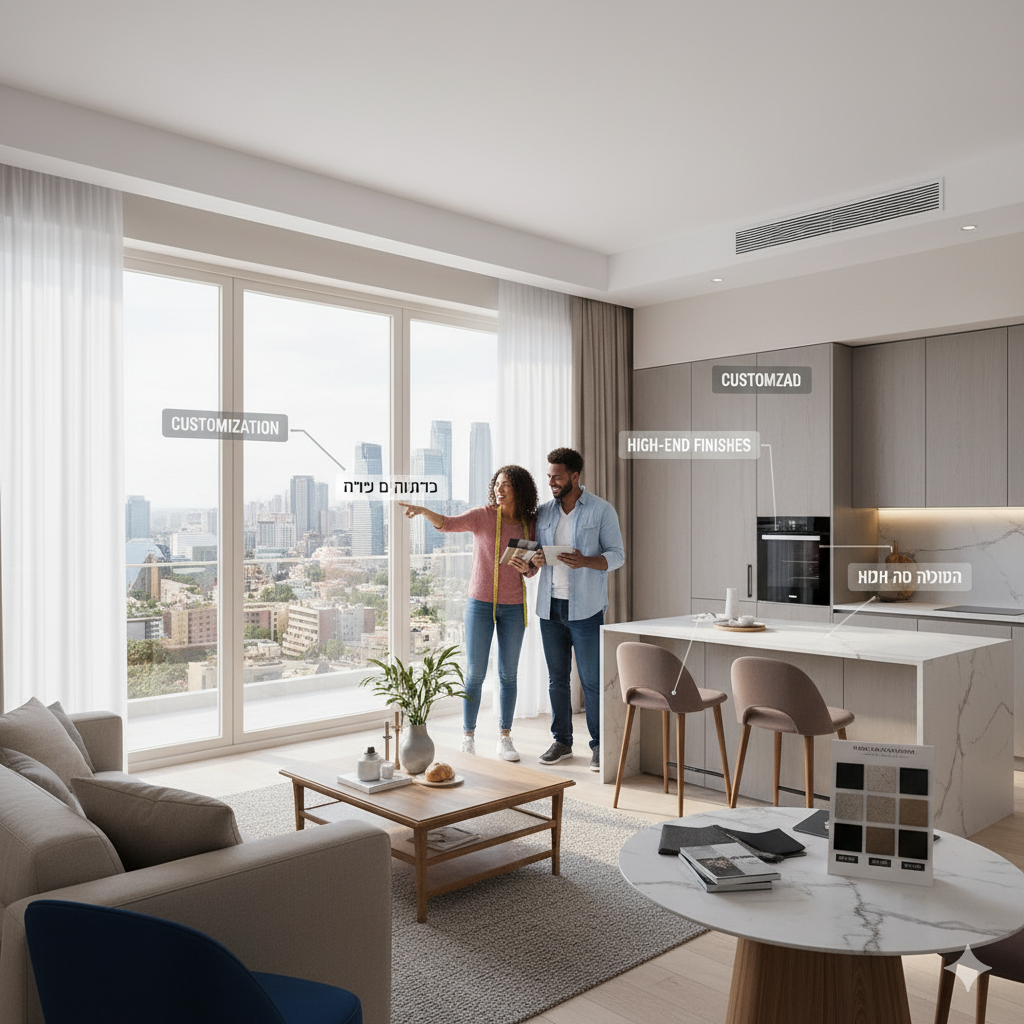The Complete Guide to Buying a New Apartment: All You Need to Know About Pre-Sale Apartments
Are you looking to enter the real estate market or invest in a property with high potential returns? If so, you need to know about Pre-Sale Apartments. This is a popular and very beneficial method for buying a property, offering many advantages over purchasing an existing home on the market. In this article, we will delve into the topic and provide you with all the tools and knowledge needed to make a smart and secure purchase.
What Exactly is a Pre-Sale Apartment?
A Pre-Sale Apartment is a term that describes a home sold by a developer or contractor before construction has begun, or during its early stages. The purchase is made based on architectural plans, renderings, and a detailed contract that defines all the terms of the transaction. In this method, buyers effectively become partners in financing the project, and in return, they receive an attractive price and favorable payment terms. The opportunity to get a brand-new home this way, or as it’s known in Hebrew, a דירה חדשה מקבלן, has become a compelling option for many.
The Main Advantages of Buying a Pre-Sale Apartment
- Lower Price: One of the most significant benefits is the price. Developers often offer these apartments at a lower price than the expected market value to attract buyers and expedite the start of the project. The price difference can amount to tens or even hundreds of thousands of dollars, making the deal especially worthwhile.
- High Investment and Return Potential: Since you are buying the property at a lower price, its value naturally increases as construction progresses and the area develops. This means the property may be worth much more on the day you receive the keys, generating immediate profit.
- Customization Options: Unlike second-hand apartments, a new apartment from a developer allows you to choose the interior design. This includes selecting flooring, kitchen cabinets, bathroom fixtures, and even making minor changes to the layout, subject to the contractor’s limitations. This ensures that the apartment fits your taste and needs precisely.
- Flexible Payment Terms: Most pre-sale deals offer convenient payment terms, where the initial down payment is relatively low (usually around 10-20%), and the rest of the amount is paid in installments according to the construction progress. This eases the financial burden and allows you to better prepare for the subsequent payments.
- Contractor’s Warranty: After receiving the apartment, you benefit from a warranty period during which the contractor is responsible for fixing any defects or flaws that are discovered. This is a crucial protection that ensures the apartment you received is of the highest quality.
Who is a Pre-Sale Apartment Purchase Suitable For?

Buying a pre-sale apartment is suitable for several groups of people:
- Young couples and families looking for their first home at an affordable price.
- Investors who want a property with the potential for quick profit and high returns.
- Homeowners who want to sell their current home at their own pace while waiting for the new property to be completed.
The Key to Success: How to Choose Wisely
To ensure the deal is successful, it is essential to conduct comprehensive checks:
- Check the Contractor and Developer: Look for information on the contractor’s previous projects. Check their reputation, the quality of their construction, and their adherence to timelines.
- Understand the Contract: Go through the contract with a lawyer who specializes in real estate. Make sure you understand all the clauses, payment schedules, and what happens in case of delays.
- Visit the Project Site: If the construction has already started, visit the site to get a feel for the location and the progress.
Investing in pre-sale apartments can be one of the smartest financial decisions you make. With a bit of research and careful planning, you can secure a beautiful new home or a high-yield investment.
The Pre-Sale Purchase Process: A Step-by-Step Breakdown
Successfully buying a pre-sale apartment is all about preparation. Following these steps will help you move from prospect to proud homeowner with confidence.
- Thorough Due Diligence on the Developer: This is the single most critical step. A developer’s reputation is your best guarantee. Research their previous projects, look for online reviews, and check their financial stability. A reputable developer will have a solid track record of completing projects on time and to a high standard. You want to see satisfied customers and a history of quality construction, not a trail of unfinished work or legal disputes.
- Secure Your Financing Early: While pre-sale payment plans are flexible, you’ll still need to secure a mortgage. Get a pre-approval from a lender before you commit to a contract. This not only gives you a clear budget but also shows the developer you are a serious and capable buyer. Understand the payment schedule, which is typically tied to construction milestones, and ensure you have a clear plan for each payment.
- Hire a Real Estate Lawyer: This is non-negotiable. A real estate lawyer specializing in new construction is your greatest asset. They will review the purchase contract with a critical eye, looking for clauses that could put you at risk. They will negotiate on your behalf to include protections such as penalties for construction delays, a clear list of what’s included in the base price, and guarantees about the final quality of the finishes.
- Review the Contract in Detail: A pre-sale contract can be complex and intimidating. Your lawyer will help you understand every clause, including the project timeline, what happens in case of delays, the precise specifications of your apartment, and the terms of the warranty. Don’t sign anything until you are 100% clear on what you’re agreeing to.
Navigating Potential Risks and How to Mitigate Them
No real estate transaction is without risk, and pre-sale apartments have their own unique set of potential pitfalls. Being aware of them allows you to prepare and protect your investment.
- Construction Delays: This is arguably the most common issue. Projects can be delayed for a variety of reasons, from unexpected weather to supply chain issues. Your contract should include a “delay penalty” clause that compensates you for each month the completion is late.
- Changes to the Plans: What you saw in the glossy brochure may not be the final product. Developers may make changes to the floor plan, materials, or amenities. Ensure your contract specifies that any material changes must be approved by you and that you have the right to cancel the agreement if a change is significant.
- Hidden Costs: Beware of unexpected costs not included in the base price. These can include utility connection fees, landscaping costs, or mandatory upgrades. Get a clear breakdown of all potential fees upfront so there are no surprises at closing.
The Final Stretch: Walkthrough and Closing
After months of waiting, the final stage is here. This is where your investment becomes a reality.
- The Walkthrough (בדק בית): This is your final chance to inspect the finished apartment before you take ownership. Walk through with a critical eye, making a list of any defects, no matter how small. This is often called a “punch list” or בדק בית in Hebrew, which translates to a “home inspection.” The developer is obligated to fix any items on this list before or shortly after you move in.
- Final Closing: Once all conditions are met and any issues from the walkthrough are resolved, you will close the deal. The remaining balance is paid, and the keys are yours.
By understanding the process and preparing for potential risks, you can confidently navigate the world of pre-sale real estate. It’s an investment that offers incredible rewards, and with the right approach, you can turn the dream of a new home into a successful reality.

